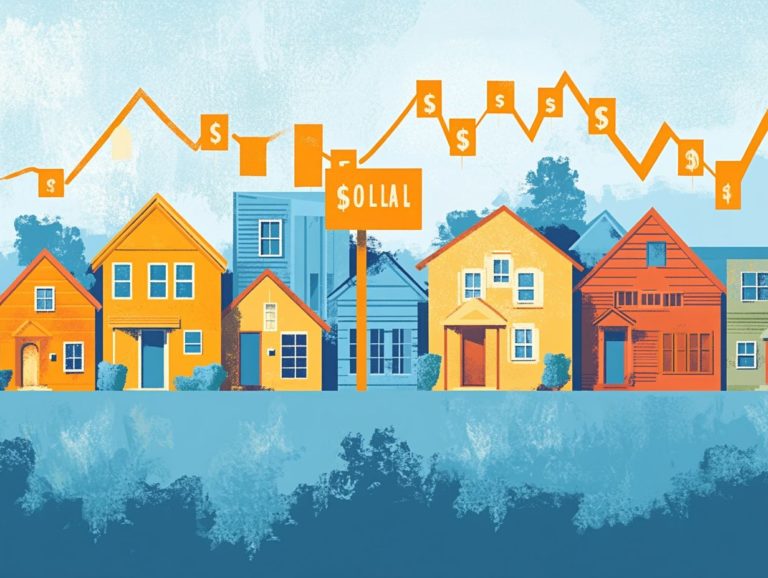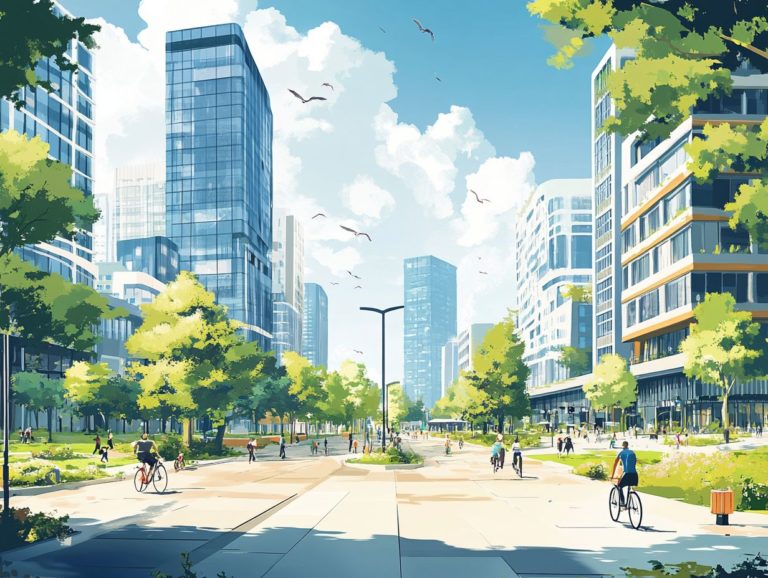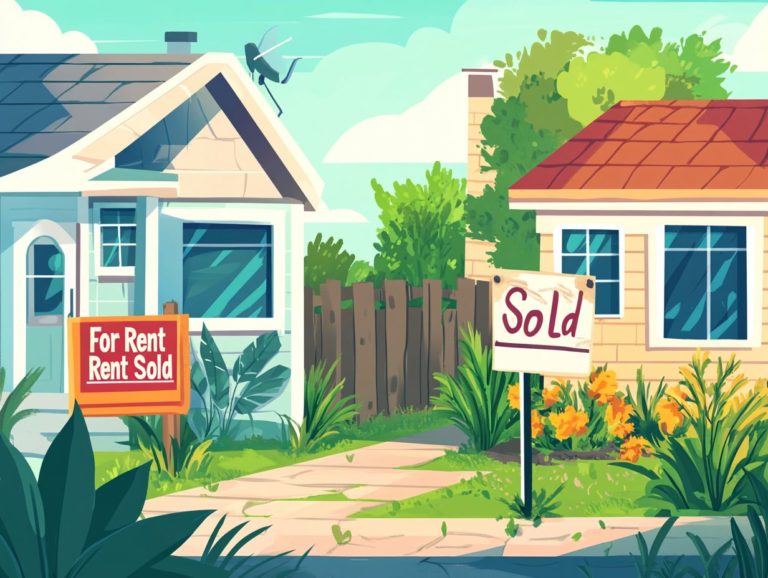The Importance of Home Value Appreciation
Understanding home value appreciation is crucial for you, whether you re a current homeowner or a prospective buyer. This article delves into what home value appreciation really means, the key factors that influence it, and its significance in the real estate landscape. You ll discover how appreciation can yield financial benefits, affect the broader market, and provide strategies to enhance your home s value. Let s discover key pitfalls to avoid so you can maximize your profits!
Contents
Key Takeaways:
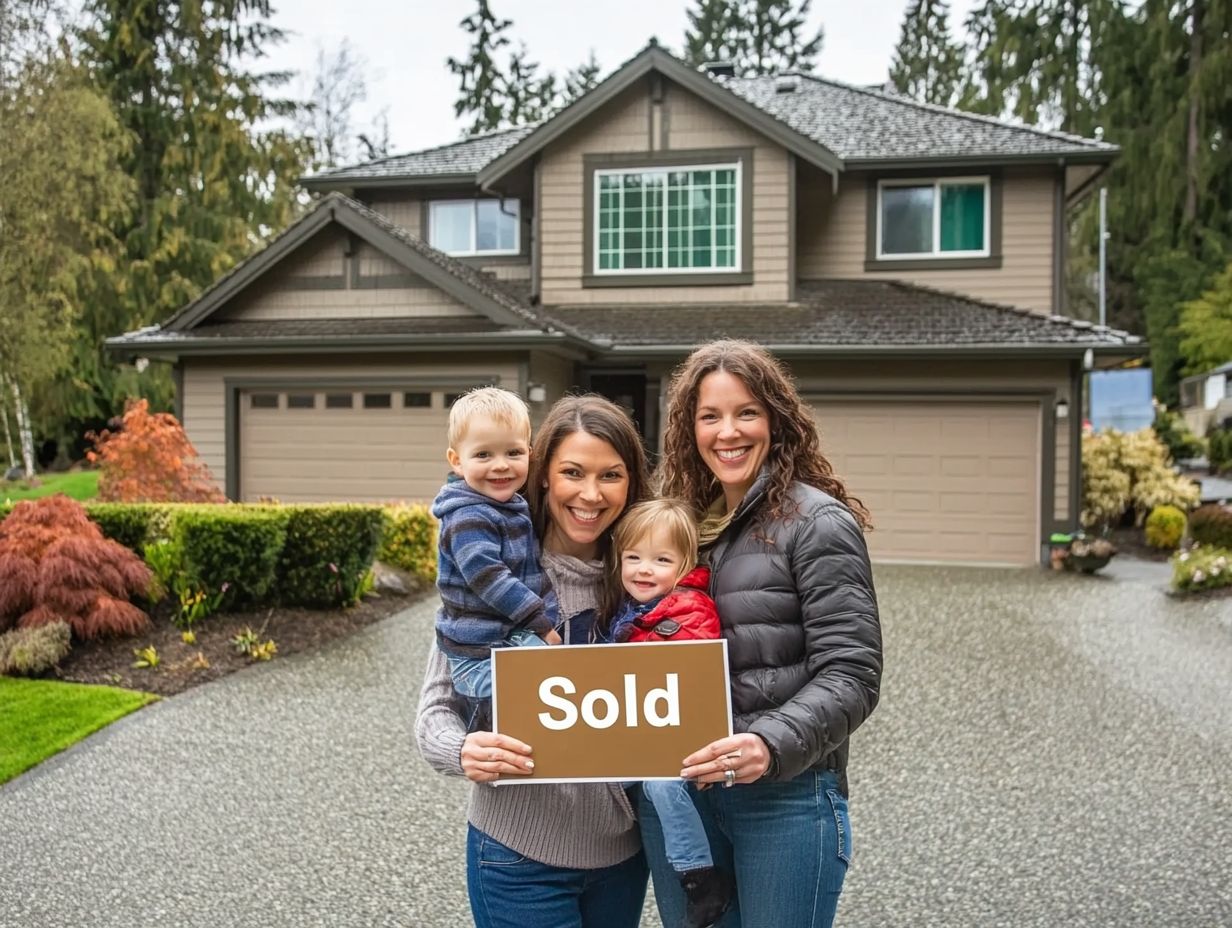
- Your home can increase in value due to market conditions and improvements.
- Appreciate the financial benefits and impacts on the real estate market.
- Focus on smart improvements and location to boost your home’s value.
Understanding Home Value Appreciation
Understanding home value appreciation is essential for both homeowners and investors. It signifies the growing worth of properties over time, shaped by numerous factors like location, demand, and market conditions. As the real estate market evolves, grasping the intricacies of appreciation enables you to make informed decisions.
This knowledge helps ensure that you invest wisely in desirable homes within sought-after neighborhoods. Whether you re weighing the influence of local amenities or considering the broader economic landscape, recognizing the nuances of home value is crucial for anyone navigating the property market.
Definition and Factors that Affect It
Home value appreciation refers to the increase in your property’s market value over time. This is influenced by various factors, such as the economy, local demand, and supply dynamics, which refer to the number of homes available for sale.
This process is significantly shaped by broader economic conditions, including employment rates, inflation, and consumer confidence. These factors can greatly dictate your eagerness as a buyer or seller.
Fluctuations in interest rates directly impact how much buyers can afford to borrow, determining how many buyers can step into the market. Neighborhood characteristics also play a crucial role; being close to schools, parks, and public transportation can elevate desirability, leading to higher price appreciation.
Local amenities and the overall safety of an area can create trends that foster a competitive real estate market, contributing to consistent property value growth over time.
Why Home Value Appreciation Matters
Home value appreciation is crucial for you as a homeowner. It translates into increasing equity, offering financial advantages that help you build wealth and explore investment opportunities in the real estate market. For more insights, check out understanding home appraisals and their importance.
This appreciation not only boosts your property s market value but also shapes the broader economic landscape. It enables you to leverage your investments for further developments or renovations.
By grasping the significance of appreciation rates, you can make informed decisions that profoundly influence your financial future.
Financial Benefits for Homeowners
The financial benefits of home value appreciation for you as a homeowner can be significant. Increasing equity opens up a world of investment opportunities and financial leverage.
As home values rise, you find yourself in an advantageous position to tap into your equity, which can lead to attractive refinancing options. This not only lowers your monthly payments but also provides access to additional capital that can be utilized for various purposes.
Increased equity can serve as a launching pad for funding renovations, further enhancing your property s value, or for making new investments that could generate additional income.
By leveraging your property, you re not just setting yourself up for personal gain; you re actively crafting a more secure and prosperous financial future.
Impact on Real Estate Market
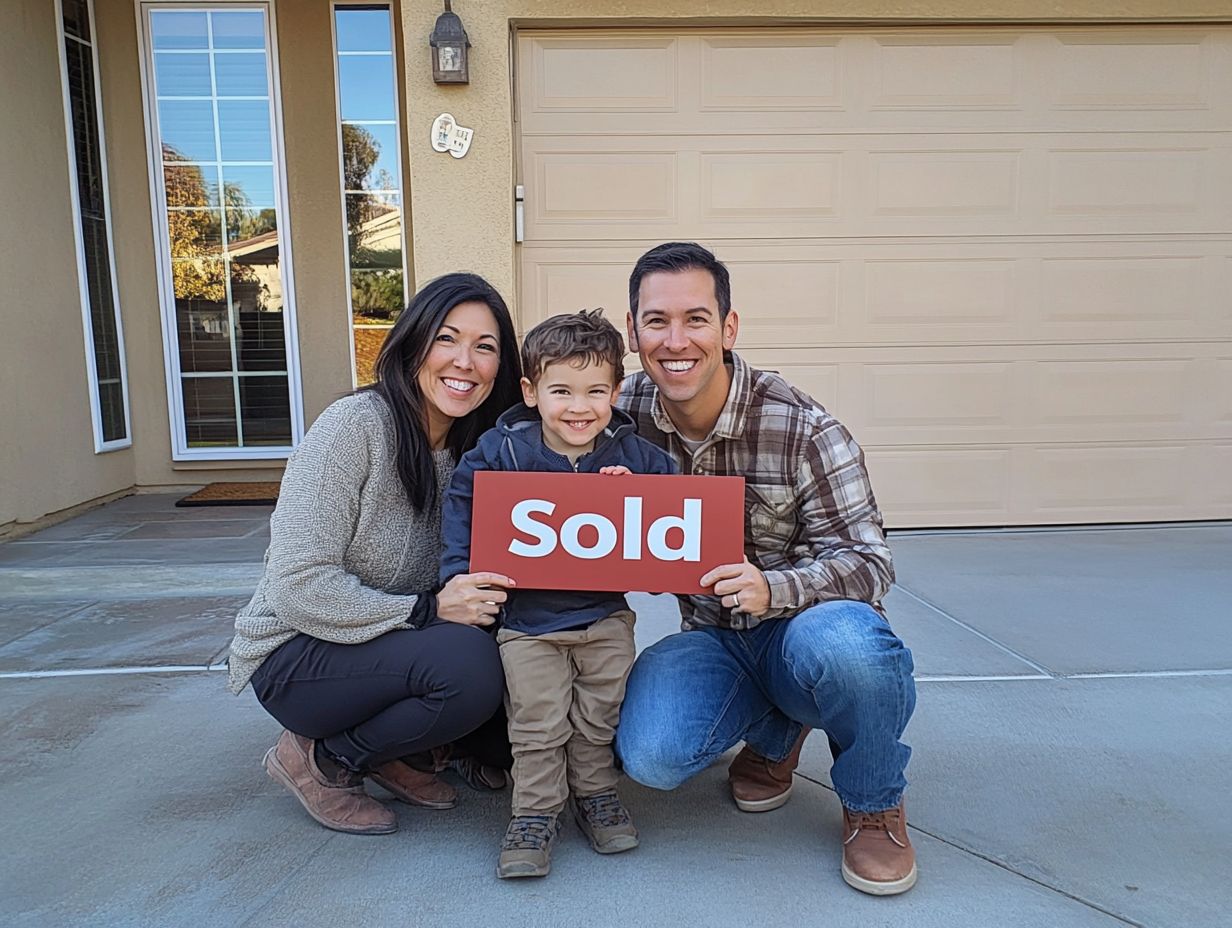
The impact of home value appreciation on the real estate market is significant, driving demand and shaping supply dynamics as property values rise.
This trend influences buyer behavior. Prospective homeowners often act quickly due to concerns about rising prices, which increases competition among buyers.
As more individuals seek to secure properties before costs climb higher, investment trends also shift. Investors look for opportunities in neighborhoods that are likely to appreciate.
This creates fluctuations in market conditions, fostering urgency that can lead to intense bidding wars.
Understanding these dynamics helps industry professionals anticipate trends and provide informed guidance to clients, making knowledge of home value appreciation essential for navigating today’s real estate landscape.
Ways to Increase Home Value Appreciation
Increasing your home s value is a strategic pursuit that you can achieve through various methods.
Consider targeted improvement projects, thoughtful renovations, and a careful evaluation of your location and neighborhood. Informed decisions about upgrades can significantly enhance your property s value, leading to greater returns on your investment.
This proactive approach elevates your home and positions it well in the real estate market, where buyer demand is crucial.
Home Improvement Projects
Home improvement projects are vital for increasing your property’s value. Well-executed renovations can greatly enhance its appeal and marketability.
When you invest in thoughtful upgrades, you elevate your living space and make your property more attractive to potential buyers.
Simple renovations, like updating your kitchen with modern appliances, adding an energy-efficient bathroom, or enhancing curb appeal through landscaping, can significantly increase your property s desirability.
Opting for smart home technology, like automated lights and security systems, can make your home more appealing to buyers looking for modern conveniences. This can lead to a quicker sale and potentially higher returns on investment.
By focusing on strategic improvements, you can create a lasting impact on your property’s overall value and desirability in a competitive market.
Location and Neighborhood Considerations
When buying a home, location and neighborhood are crucial factors that significantly influence property value appreciation.
Desirable communities with essential amenities consistently attract higher demand from buyers. A vibrant neighborhood with parks, shopping centers, and convenient public transport options enhances appeal and attracts prospective homeowners.
Top-rated schools can also elevate property values, as families prioritize educational opportunities for their children. A community with low crime rates fosters safety, making potential buyers more likely to invest in the area.
These characteristics contribute to stable or increasing home prices while creating a strong sense of belonging. This is essential for anyone looking to establish long-term residency.
Factors that Can Decrease Home Value Appreciation
Several factors can hinder the appreciation of your home’s value, from unfavorable conditions to common mistakes that lessen its appeal and marketability.
Identify these pitfalls to protect your investment. Neglecting maintenance, renovations, and the state of your neighborhood can lead to depreciation.
By understanding what contributes to declining appreciation, you can take proactive steps to safeguard your investment and ensure it continues to thrive in the market.
External Factors

External factors such as market conditions, economic trends, crime rates, and zoning regulations can profoundly influence how much a home appreciates in value. If these factors aren t managed thoughtfully, they can lead to depreciation.
When you’re ready to sell, keep an eye on the real estate market. Fluctuations can dramatically alter your expected returns, especially during times of economic instability or unexpected rises in interest rates.
High crime rates in your area can scare off potential buyers. This decreases demand and ultimately drives down property values.
Moreover, stringent zoning regulations can restrict development opportunities or create hurdles to expansion, effectively putting a freeze on growth in local neighborhoods.
All these elements serve as vital reminders of how interconnected the various aspects of your environment are in shaping the housing market. Stay informed about these external variables, whether you re a prospective buyer or a current homeowner.
Mistakes to Avoid as a Homeowner
As a homeowner, it’s crucial to be aware of common mistakes that could lead to depreciation and negatively impact your property’s value.
Neglecting regular maintenance tasks can allow minor issues to snowball into costly repairs that deter future buyers. Additionally, failing to complete necessary renovations like updating kitchens or bathrooms can significantly diminish your home’s appeal in a competitive market.
Stay vigilant about fluctuations in the local housing market. Overlooking these trends may cause you to miss valuable opportunities for strategic improvements that enhance your property s value.
Stay ahead by keeping yourself updated on your home’s upkeep and market trends to ensure long-term appreciation.
The Role of Home Value Appreciation in Selling a Home
The role of home value appreciation in selling your home is crucial. By understanding and leveraging appreciation, you can maximize your profits and attract potential buyers.
Recognizing how your home’s value has increased allows you to set a competitive price that aligns with current market conditions and buyer demand. Highlighting the features that contribute to your home’s appreciation can significantly enhance its appeal, paving the way for a successful sale in today s dynamic real estate landscape.
Maximizing Profits and Attracting Buyers
To maximize your profits and attract buyers, you need to effectively leverage home value appreciation and present your property in a way that makes it stand out in the competitive real estate market.
This means highlighting key features that have boosted your home s worth over the years while ensuring the property is in pristine condition.
Consider focusing on minor renovations or aesthetic upgrades that can yield significant returns.
Conducting a thorough study of the housing market is essential for setting a competitive pricing strategy that reflects your home s full potential value.
Engaging a knowledgeable real estate agent can provide invaluable insights into the latest trends, allowing you to position your home favorably for prospective buyers ready to invest.
Frequently Asked Questions
What is home value appreciation?

Home value appreciation is the increase in value of a property over time. It measures how much a home’s worth has grown since its original purchase.
Why is home value appreciation important?
Home value appreciation is important because it represents the potential return on investment for homeowners. It can also impact the overall value of the neighborhood and the local economy.
How does home value appreciation affect my property taxes?
As your home’s value increases, your property taxes may also go up. This is because property taxes are based on the assessed value of your home, which includes its appreciation.
What factors can affect home value appreciation?
Several factors can influence home value appreciation, including the state of the housing market, location, renovations and updates, and the overall economic climate.
How can I increase my home value quickly?
Consider making strategic updates, enhancing curb appeal, and ensuring the property is well-maintained to boost its value in a short time frame.
Can I increase my home’s value appreciation?
Yes, you can definitely increase your home’s value appreciation! Making strategic updates can really boost your property’s worth.
How can I use home value appreciation to my advantage?
Home value appreciation helps you build wealth and improve financial security. Take advantage of it! It s your chance to refinance or sell your home for a higher price.


